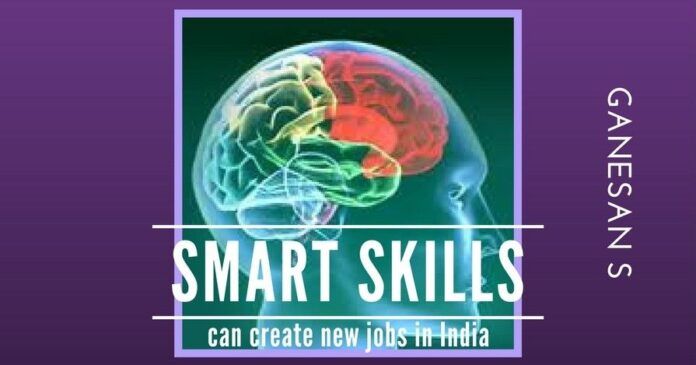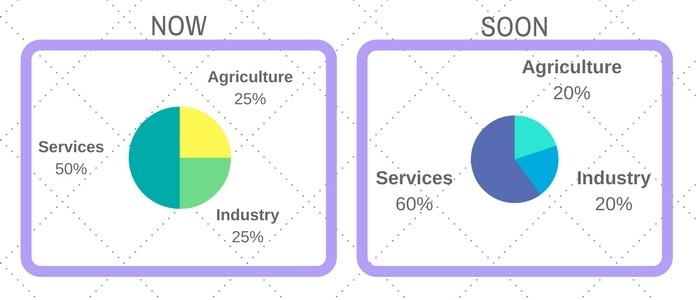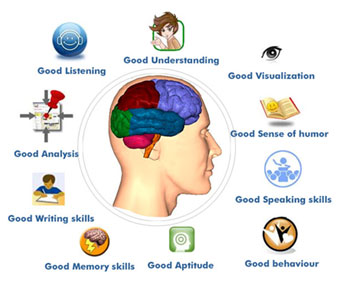
There are two views about whether Indian economy is in a fundamentally bad shape, or it is just going through a technical correction and soon it will bounce back. I strongly believe it is fundamentally strong. Regardless of which of these views is right, there are no two views about the job scenario in India and the world over: the prognosis is not very encouraging.
Smart Skilling of students at schools and colleges across the board is possible far more easily, comprehensively and cost-effectively than after they leave their institutions when they start looking for jobs.
Among the 3 sectors viz., agriculture, industry, and services, the need for labor in agriculture in India has long been shrinking, and desirably so. With increasing mechanization and automation in industry, the need for labor in the industry is also shrinking, and it is only expected to get worse; though not desirable, this decline cannot be stopped, as otherwise, we would be uncompetitive in the globalised marketplace, our imports will increase and exports will fall.
The sad part is that the job losses in the industry may not even be compensated by job increase in industry, making matters worse.
At present Agriculture and Industry employ a little less than 25% of Indian workforce each, and Services a little above 50%. Employment in Industry and Agriculture could come down to less than 20% each in the near future. Services should then contribute about 60% of the employment.

Job opportunities in IT, which is one of the best formal Services sector employer, is shrinking too due to increasing efficiency, automated coding, etc. This, combined with the current high levels of unemployment and under-employment, leaves us with the need to generate lots and lots of non-IT Service sector jobs.
The global average contribution of Services sector is around 70%. So, with some difficulty, our target should be achievable, with planned, concerted and painstaking effort.
How can the Government enhance non-IT Services sector jobs by an order of magnitude more than at present? The obvious focus areas are infrastructure development, travel & tourism, transportation, healthcare, hospitality, education, trade, and telecom. Of course, the Government should also do its best to create more jobs in IT, despite the limitations. All these are a given, and we’ll assume the Government will continue to do what best it can.
The Government, by itself, won’t be able to create jobs; it can only create an enabling environment for profitable for private entrepreneurs to create businesses in these realms, which should create these jobs.
But these efforts won’t be adequate. Government jobs themselves will be just a small fraction of the total jobs, though they will be the most sought after; in the process, the Government will contribute to the widening of the gap between the income of the haves and have-nots.
What more can the Government do in this situation? The Government, by itself, won’t be able to create jobs; it can only create an enabling environment for profitable for private entrepreneurs to create businesses in these realms, which should create these jobs. The Government should also facilitate an environment that can produce more and more entrepreneurs and employable youth who can more easily find jobs.
In future, jobs are not going to be easy to get; there will be stiff competition for the few Government and formal sector jobs. Youth will have to vie for these jobs in a competitive environment. Increasing number of informal sector jobs won’t have a negative connotation around them, as long as they are reasonably paying.
Some jobs will be couched as entrepreneurship and vice versa. For example, are home nurses and physiotherapists deputed for prolonged durations to attend to aged and disabled, Ola and Uber drivers, who get paid only based on work they do, entrepreneurs or employees?
In the emerging economy, youth with smart skills will identify jobs that are right for them across India (or the world) and stake their claim, some very smart ones will even get companies to create jobs around them, and the entrepreneurially-inclined will create their own business opportunities, and create jobs for others.
Luckily, such smart skills can be imparted through training.

Smart Skilling of students at schools and colleges across the board is possible far more easily, comprehensively and cost-effectively than after they leave their institutions when they start looking for jobs. Being captive audience at schools and colleges, and in a frame of mind to learn, imparting smart skills at this stage is likely to be more successful and cost-effective.
Job-specific skills can be given by industries and industry associations, through apprenticeship/ employment. But they will expect the candidates to be smart raw material, which generic smart skills training can give.
There are 2 kinds of skills that the average youth coming out of schools & colleges need to be employable: (i) Generic Smart Skills, (ii) Job-Specific Skills.
Generic Smart Skills include communication skills (including sales skills), interpersonal skills, team skills, mind skills, social skills, etc, and will seek to develop self-esteem in the participants. They also include imbibing fairly strong principles & value systems, healthy family & relationships, humaneness, ability to face adversities, etc., and could develop the participants into good leaders. A certain level of these skills is required for all jobs and even for entrepreneurs.
Job-specific skills can be given by industries and industry associations, through apprenticeship/ employment. But they will expect the candidates to be smart raw material, which generic smart skills training can give.
In fact, a large percentage of the money spent by the Ministry of Skill Development & Entrepreneurship through private training institutions is wasted, with no commensurate results because training institutes typically conduct ‘How To’ kind of quick-fix skills training not based on principles of HRD. Instead the Ministry can make its investment in generic skill development in schools and colleges, aided by expert HR Consultants. Job-specific skill development can be done after school/ college.
You can’t make someone smart just by teaching them a quick few tricks. Human Resource Development (HRD) has to be holistic, based on Concepts, Competencies, Strategies and Action Plans, developed over time. Each student should be developed to be a leader in her/ his own right, with a healthy attitude to the society and to its problems & solutions. Such Smart Skills training will help them find (or even create) their own jobs, even in adverse economic situations.
This requires the Ministry of HRD and Skill Development & Entrepreneurship to work jointly; success will bring credit to both these Ministries. This will also deliver more bang for the buck; with the limited budget of the Government, it is possible to train almost the entire student population, though extending across the country may have to be done in stages due to practical considerations.
If the Government doesn’t act today, fewer youth will get jobs in future even as increasing number of jobs are lost every day, and the problem of unemployment will get too daunting to contain.
- How BJP can get 33%+ vote share in TN - April 1, 2024
- A transparent, equitable electoral funding alternative - March 19, 2024
- How TN BJP can come to No. 1 or No. 2 in 2024 LS polls - January 11, 2024











[…] of issues like Agrarian Distress, Is doubling of Farmer’s income possible by 2022, Unemployment, SC-ST-OBC Reservation issues, Women’s Reservation, Housing For All, etc need to be addressed on […]
[…] had written another article titled, “Creating Jobs In Jobless GDP Growth Scenario” , wherein I had outlined a proven model of training which can make our graduates of all streams far […]